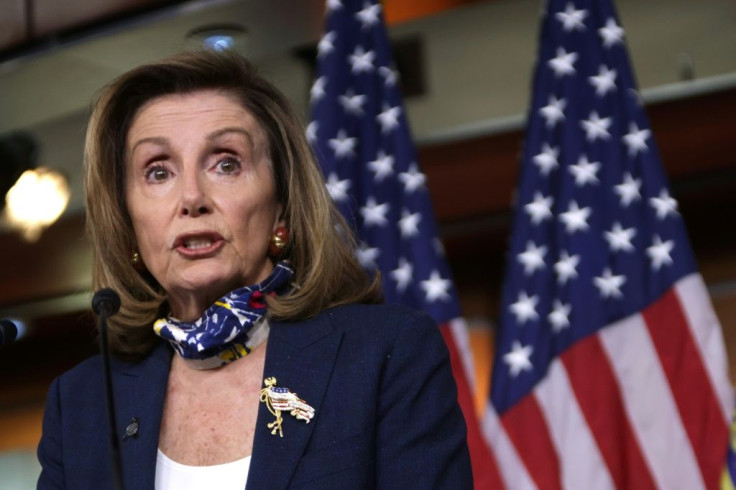Nancy Pelosi Gambles On Election, Passing Spending Bill To Delay Shutdown Fight Until After November
KEY POINTS
- The House passed a short-term bill that would fund the government through Dec. 11
- In exchange, Democrats received $8 billion in food aid, but Republicans now have the opportunity to avert a shutdown until after the presidential election
- Representatives from both sides and constituents lamented the lack of a broader economic stimulus to help struggling families
House Speaker Nancy Pelosi and House Democrats have sent a short-term spending bill to the Senate, exchanging food assistance for a delay on the more significant funding fight until after the election.
Should Democrats win the presidency and the Senate, Pelosi could be in a better bargaining position during the lame-duck session, but the move also allows Republicans a chance to delay a potentially embarrassing government shutdown until after the presidential election.
The government is slated to run out of funds at the end of September without an extension.
Polling information from FiveThirtyEight.com indicates President Trump's approval rating dropped sharply the last time the government was shut down in December 2018, with the number of Americans who disapproved of him jumping from 52% to 56% -- among the highest disapproval numbers of his term. Such a drop could prove decisive this close to an election.
The New York Times reported Democrats had hoped to delay a full funding bill until after the next government is sworn in. A congressional aide told the Hill that “most Democrats prefer an end date in 2021," but ultimately they could not get Republicans to agree to a measure that carried so much risk for them. If Democrats take the Senate or the White House, Republicans would have much less leverage to accomplish their funding goals.

The stop-gap spending bill passed the House, 359-57. Spending bills had previously failed over concerns that Trump was using agricultural funds to benefit his allies. The new bill still contains that aid, but with provisions mandating it not be used for fossil fuel subsidies.
Moderate Democrats, like Rep. Cindy Axne of Iowa, had insisted the aid remain.
"I am deeply frustrated that once again Washington is playing games with the vital aid that Iowa’s farmers need as they continue to struggle with the long-term effects of a public health crisis, an economic downturn, a trade war and recent natural disasters," she said.
In return for the funding, Democrats received $8 billion in nutritional assistance for struggling families as well as an extension of food waiver programs. Conspicuously absent from the measure were any larger supports for the millions of Americans struggling as a result of the economic fallout of the COVID-19 pandemic. A bipartisan group of representatives expressed frustration with the lack of prospects for the next round of stimulus.
“We were elected to represent the best interests of our constituents and the country,” they wrote in a letter. “Our constituents' expectations in the midst of this crisis are that we not only rise to the occasion and stay at the table until we have delivered the relief they so desperately need, but also that we set aside electoral politics and place the needs of the country before any one region, faction or political party.”
That sentiment was shared by constituents voicing their dissatisfaction with the bill on social media. Others vented their disappointment that Pelosi hadn’t held out for more.
Ok. Great. What about stimulus checks?
— K. A. Graber (@secretfirepub) September 22, 2020
Why do the Democrats keep cooperating and following norms while the GOP does not. I know it’s the ‘right thing to do’ but it’s super frustrating watching them be so cautious.
— Avidreader (@aussieavidread) September 22, 2020
This was Pelosi’s best line of defense to hold up the scotus nomination. They already said they won’t threaten to stack the court or impeach so wtf are they doing? After decades and especially the last 4 years they think republicans are gonna be guilted to do the right thing? 🤦🏼♂️
— Tom Kelly (@realtomkelly) September 23, 2020
© Copyright IBTimes 2024. All rights reserved.











